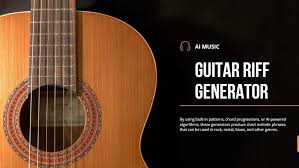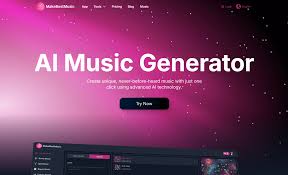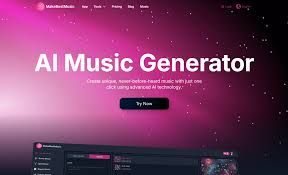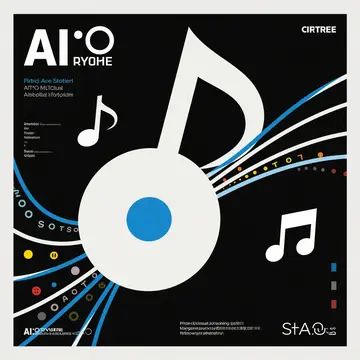Introduction: The Rise of AI Music Search Tools in the Streaming Era
Finding the perfect song used to be about scrolling through playlists or typing vague keywords into search bars. But with the rise of AI, that experience is transforming—fast. Today, AI music search tools use deep learning, audio fingerprinting, and natural language processing to help users find the right song, even if they don’t know the title or artist.
Whether you're looking for a lo-fi beat for a YouTube vlog, trying to match a melody stuck in your head, or organizing a massive music library, AI-powered search tools have become essential. This article explores the best AI music search tools, how they work, who should use them, and what makes them stand out in 2025’s competitive music tech scene.

What Are AI Music Search Tools?
AI music search tools are software platforms or algorithms that analyze audio content and allow users to search for music using advanced AI techniques. Unlike traditional search engines that rely on exact keywords, these tools understand the context, mood, genre, tempo, and even lyrics of a track to deliver more accurate results.
Key capabilities often include:
Audio-to-audio search (humming, singing, or uploading a clip)
Text-to-music search (descriptive prompts like “upbeat jazz instrumental with piano”)
Mood or genre-based filters
Audio fingerprint matching
Machine learning-driven recommendations
Best AI Music Search Tools You Should Try
Aimi.fm
Adaptive listening sessions powered by AI
No fixed playlists—music evolves with your behavior
Ideal for relaxing, studying, or background music
Overview: Aimi.fm uses AI to help users discover ambient and generative music personalized to their preferences.
Key Features:
Best For: Listeners looking for a more dynamic, emotion-aware experience
Endlesss
AI-assisted jam suggestions
Discover beats by emotion or style
Real-time search during live collaboration
Overview: Endlesss blends collaborative music creation with AI-driven music search.
Key Features:
Best For: Musicians and producers looking to collaborate and explore sounds
SoundHound AI
Voice-based music queries (e.g., “What’s that song that goes ‘la la la…’”)
AI assistant called “Houndify”
Lyric-based search and humming recognition
Overview: Famous for its voice recognition and song identification, SoundHound now integrates deeper AI-based search features.
Key Features:
Best For: Everyday users who want voice-driven discovery
Suno.ai (with experimental audio search)
Text-to-music prompt search
Semantic search of generated music library
Future plans for searchable audio fingerprinting
Overview: Known for song generation, Suno is exploring AI music search as part of its ecosystem.
Key Features:
Best For: Creators using AI-generated music and looking to search within their own catalogs
Audius
Community-generated metadata
Genre/mood search enhanced by AI
Fast-growing catalog of indie artists
Overview: A decentralized music streaming platform that uses AI for tagging and search improvements.
Key Features:
Best For: Listeners who support open-source music distribution and discovery
Google Sound Search
Search by humming or singing
Integrates with Google’s Knowledge Graph
Shows related songs and versions
Overview: A part of Google Assistant, this tool helps users identify and search for music using short snippets.
Key Features:
Best For: Instant recognition of mainstream tracks
Musiio (by SoundCloud)
Audio similarity search
Auto-tagging for mood, energy, genre
Used by labels, sync licensing agencies
Overview: Musiio is an AI-powered search engine used by B2B clients to organize and tag large music libraries.
Key Features:
Best For: Music industry professionals handling large catalogs
How AI Music Search Tools Actually Work
Let’s break down what happens under the hood:
Step 1: Input Recognition – This could be a voice command, typed prompt, or audio snippet.
Step 2: Feature Extraction – AI analyzes tempo, timbre, key, melody, and harmony.
Step 3: Embedding Matching – Music is translated into mathematical vectors and compared to existing ones in a database.
Step 4: Semantic Search – AI interprets emotional or contextual keywords like “cinematic,” “dark,” or “happy” to find best-fit results.
This allows users to search by feel, not just file names or metadata.
Why These Tools Matter in 2025
The explosion of content on platforms like YouTube, TikTok, and Spotify means users need better discovery methods. AI music search tools serve this need by:
Saving time in finding background music
Helping creators stay within copyright guidelines
Assisting artists in music research or composition
Matching content to moods and emotions
For musicians, it’s a way to locate samples, remixable loops, or similar tracks. For casual listeners, it’s about finding new favorites effortlessly.
Real Data: How AI Music Search Is Growing
According to MIDiA Research, over 70% of Gen Z discover music through short-form video, making search accuracy critical.
SoundHound processed over 100 million music queries in 2024.
Musiio’s tagging AI reduced catalog management time by 80% for some labels.
These stats highlight how AI music discovery is scaling alongside user expectations.
Common Limitations to Be Aware Of
Despite all the advances, these tools still face some challenges:
Low recognition rates for extremely niche or underground tracks
Limited effectiveness with poorly recorded audio clips
Some platforms restrict full functionality behind paywalls or B2B models
Privacy concerns with always-on voice search (like in smart speakers)
Conclusion: Choosing the Best AI Music Search Tool for Your Needs
The best AI music search tool really depends on who you are. If you're a casual listener, SoundHound or Google Sound Search are great starting points. For content creators, Musiio and Aimi.fm offer powerful tagging and emotion-based recommendations.
The key advantage of using AI for music search lies in its contextual awareness. Instead of relying on static metadata, these tools understand what you mean—whether you say “a dark synthwave beat for late-night driving” or hum a song you heard at a café.
As the technology improves, expect to see more platforms adopting AI search layers—not just to find songs, but to understand them.

FAQs About the Best AI Music Search Tools
Q1: Can I search music by humming with AI tools?
Yes, tools like SoundHound and Google Sound Search allow you to search songs by humming or singing.
Q2: What is the most accurate AI music search tool?
Shazam and SoundHound lead in accuracy for mainstream tracks. Musiio is highly accurate for tagging and search in professional use.
Q3: Are AI music search tools free?
Some are free for casual use (Google, SoundHound), while others like Musiio are geared toward enterprise clients.
Q4: Can I search by mood or genre?
Yes. Tools like Aimi.fm and Audius allow you to search by emotional tone, genre, or usage scenario.
Q5: Is it safe to use AI music search tools on smartphones?
Yes, but always check app permissions—especially with voice-enabled tools—to ensure your data is secure.








